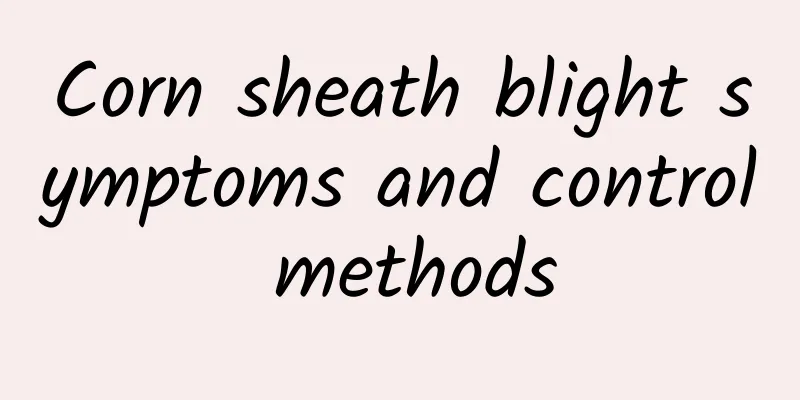Corn sheath blight symptoms and control methods

|
How should we prevent and treat corn silk sheath blight? Today I will tell you the specific methods: Corn sheath blight symptomsThe disease can infect the leaf sheath, leaves, cobs and bracts, first starting from the entire base of the leaf sheath and then spreading upward. In the early stage, water-soaked gray-green nearly circular lesions appear, which later turn into white, light yellow or reddish brown moire patches. When the humidity is high, white mold, i.e. hyphae and basidiospores, will form on the lesions, and later sclerotia will be produced, which are white at first and dark brown when mature. Disease patternThe pathogen overwinters as hyphae and sclerotia left in the soil and on diseased remains. When the temperature and humidity are suitable in the second year, hyphae grow to infect the plants and spread. The disease mainly occurs in the middle and late stages of corn growth. If it rains for a long time after jointing, the disease is serious. Fertile soil, partial nitrogen fertilizer, vigorous plant growth, low-lying terrain, poor drainage, field shade, high temperature (optimum temperature is 26-31°C), and high humidity (relative humidity above 85%) are all conducive to the disease. If the temperature is below 20°C and there is drought (relative humidity below 75%), it is not conducive to the growth of pathogen hyphae, and the pathogenicity is very weak, or even impossible to cause the disease. Corn sheath blight control methods① Remove diseased and damaged parts, destroy them or dig them up and bury them deeply. ② Plant disease-resistant varieties. ③ Sow seeds at the right time, increase the application of organic fertilizer, avoid excessive application of nitrogen fertilizer, pay attention to digging ditches for drainage, reduce field humidity, promote healthy growth of corn, and improve disease resistance. ④ Chemical control: spray 5% Jinggangmycin 1000 times, or 50% triadimefon emulsifiable concentrate 1000 times, or 50% carbendazim wettable powder 500 times, or 70% thiophanate-methyl wettable powder 500-800 times, or 40% sclerotium net 800 times, or 50% thiophanate-methyl wettable powder 500-800 times. When applying the pesticide, pay attention to spraying the liquid on the female ear and the stems below to achieve a higher control effect. |
<<: Corn Fertilization Tips How to Fertilize Corn Planting
>>: Corn's efficacy, storage methods and cooking knowledge
Recommend
How is the Paris Institute of Physics and Chemistry? Reviews and website information of the Paris Institute of Physics and Chemistry
What is the website of ESPCI ParisTech? ESPCI Pari...
The advantages and disadvantages of eating spicy food The benefits of eating chili peppers
Many people like spicy food, whether it is pepper...
The efficacy and function of cherry root The medicinal value of cherry root
Cherry is a fruit that everyone has seen and eate...
The benefits of drinking rice soup
I believe many people have eaten rice soup when t...
Top 10 Most Shade-Tolerant Indoor Plants
Many people like to grow some flowers and plants,...
The benefits and effects of golden oatmeal and the benefits of eating golden oatmeal
Golden Taste oatmeal is a popular convenience foo...
How is Shimane University? Shimane University reviews and website information
What is Shimane University? Shimane University is ...
The efficacy of Tremella and Pear Soup
Tremella and pear soup is a very common dessert. ...
Steps to make tea egg beef porridge
The tea egg beef porridge tastes good and is quite...
Physiological diseases of tomato fruit What are the main diseases of tomato
What should we do about physiological diseases of...
How to eat coconut meat? Tips on eating coconut meat
Coconut is the most common fruit in tropical area...
When is the best time to drink apple cider vinegar?
Apple cider vinegar can help you lose weight, bea...
The efficacy and function of carambola and how to eat it
Star fruit is a subtropical fruit with high nutri...
How is Alalam TV? Alalam TV review and website information
What is Alalam TV? Alalam TV (Alalam News) is a ma...
My wedding_Mywedding how is it? My wedding_Mywedding reviews and website information
Mywedding_What is Mywedding? Mywedding.com is a fa...









